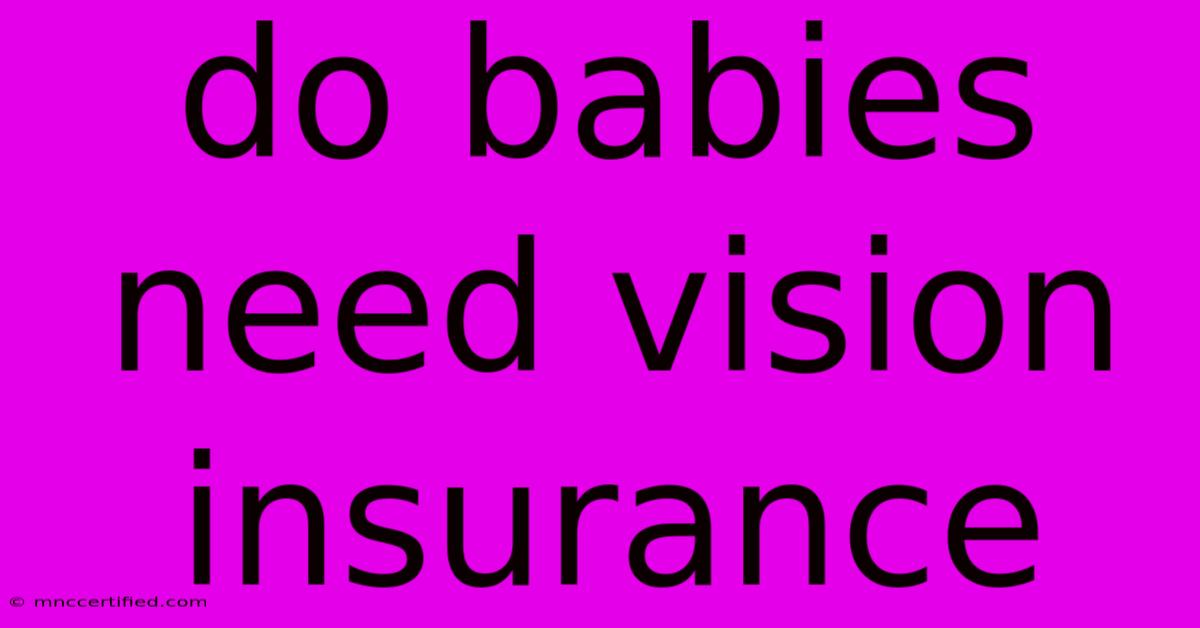Do Babies Need Vision Insurance

Table of Contents
Do Babies Need Vision Insurance? A Parent's Guide
Protecting your little one's health is paramount, and that includes their vision. While you might not immediately think of vision insurance for a newborn, it's a crucial consideration that can save you significant costs in the long run. This comprehensive guide will help you understand why vision insurance is important for babies and how to choose the right plan.
The Importance of Early Eye Exams
Many parents wonder, "My baby can't even see clearly yet, why does vision insurance matter?" The truth is, early detection of potential vision problems is crucial for healthy development. Infants and toddlers can't communicate vision issues verbally, making regular eye exams essential. These exams can identify:
- Amblyopia (Lazy Eye): This condition affects one eye's ability to focus correctly and can lead to permanent vision loss if not detected and treated early.
- Strabismus (Crossed Eyes): This is a misalignment of the eyes, often correctable with early intervention.
- Refractive Errors (Nearsightedness, Farsightedness, Astigmatism): These common conditions can impact a child's ability to see clearly and may require corrective lenses.
- Other Eye Diseases: Rare but serious conditions can be diagnosed early, allowing for prompt treatment and better outcomes.
A seemingly minor vision problem in infancy can significantly impact a child's development, affecting their ability to learn and interact with their world. Early detection and treatment through regular eye exams are key to preventing long-term problems. This is where vision insurance steps in.
The Financial Benefits of Vision Insurance for Babies
The cost of pediatric eye care can be surprisingly high. Comprehensive eye exams, corrective lenses (if needed), and potential treatments for conditions like amblyopia can quickly add up. Vision insurance significantly reduces these costs. Even a basic plan often covers a substantial portion of routine eye exams and glasses, making it a financially smart decision.
Consider These Costs Without Insurance:
- Comprehensive Eye Exam: $100 - $300+ per visit
- Glasses: $150 - $500+ per pair (depending on the type of lenses and frame)
- Specialized Treatments: Thousands of dollars for conditions like amblyopia or other eye diseases.
Vision insurance can dramatically reduce or even eliminate these expenses, making regular eye care accessible and affordable.
Choosing the Right Vision Insurance Plan for Your Baby
Several factors should influence your choice of vision insurance:
- Coverage: Look for plans that cover comprehensive eye exams, glasses (or contacts if necessary), and any necessary treatments.
- Network of Providers: Ensure the plan includes reputable pediatric ophthalmologists and optometrists in your area.
- Premium Costs: Balance the cost of premiums against the potential savings on eye care expenses.
- Deductibles and Co-pays: Understand what your out-of-pocket costs will be.
Many family health insurance plans offer vision coverage as an add-on, making it a convenient and often cost-effective choice. Alternatively, standalone children's vision insurance plans are available. Comparing plans carefully is crucial to finding the best fit for your family's needs and budget.
Beyond Financial Savings: The Long-Term Benefits
Investing in your baby's vision health is an investment in their future. Early detection and treatment of vision problems can lead to:
- Improved academic performance: Clear vision is crucial for learning and development.
- Enhanced social interaction: Children with clear vision can more easily engage in play and social activities.
- Increased confidence and self-esteem: Children who can see clearly are more likely to participate fully in life.
- Prevention of permanent vision impairment: Early intervention can prevent lifelong vision problems.
In conclusion, while it may not be the first thing on your mind as a new parent, vision insurance for your baby is a wise investment. The financial benefits, coupled with the long-term advantages for your child's development and well-being, make it a decision you won't regret. Contact your pediatrician or insurance provider to explore your options and protect your little one's precious eyesight.

Thank you for visiting our website wich cover about Do Babies Need Vision Insurance. We hope the information provided has been useful to you. Feel free to contact us if you have any questions or need further assistance. See you next time and dont miss to bookmark.
Featured Posts
-
1 2 Millones De Wones A Dolares
Nov 23, 2024
-
Ringworm Cases Rise Among Young Men
Nov 23, 2024
-
Mc Gregor Found Liable Sexual Assault
Nov 23, 2024
-
Black Rock Announces Distribution Hikes
Nov 23, 2024
-
504 Divided By 5 With Remainder
Nov 23, 2024